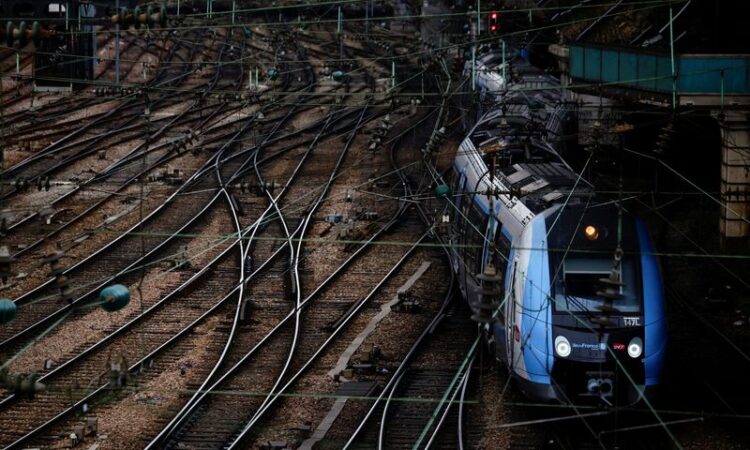
By Ingrid Melander
PARIS (Reuters) – Labour unions will seek to bring France to a standstill on Tuesday, as they step up their fight against President Emmanuel Macron’s plans to make the French work two years more, to 64, before they can retire with a pension.
Most trains will be brought to a halt, power generation will be curbed and many classes cancelled, with air traffic and refineries also affected in this sixth day of nationwide strike and protests since mid-January.
“Together, on March 7th, let’s put France to a halt!”, the country’s main unions said in a joint statement.
“People massively reject this reform,” CFDT union leader Laurent Berger told France Inter radio. “We need many, many people out in the streets … We can do better than Jan. 31, which was the largest mobilisation since the 1990s.”
Over 1.27 million people took part in the Jan. 31 protests, marching against a reform that would increase the number of years one has to work to be entitled to a pension and make people work longer for a full pension sooner than initially planned.
Opinion polls have for weeks shown that a majority of voters reject the reform, but the government says it will stand its ground and carry out what is needed to ensure the pension system does not go bust.
“The future of our pension system is at stake,” Prime Minister Elisabeth Borne told France 5 TV on Monday. “I can understand that not many people want to work two more years, but it’s necessary to ensure the viability of the system.”
While Macron’s camp does not have an absolute majority in parliament, it can count on the support of at least part of the conservative Les Republicains.
“I’m telling Emmanuel Macron to hang in there,” LR senator Bruno Retailleau said on Sunday. “If he gives in, he won’t be able to carry out more reforms, it would be the end of his (second) term.”
Still, it is unclear whether the changes will be approved by parliament, or if the government will have to ram them through by decree using special constitutional powers.
In order to increase pressure on the lawmakers, unions have threatened to extend industrial action in several sectors, including at oil refineries and railways, with decisions on whether to prolong the rolling strikes taken each evening.
Transport Minister Clement Beaune said that Tuesday’s strike would be “one of the most difficult ones” for travellers since the start of the protests. “For many it will be a real hassle”, he said.
“We are moving up a gear,” the head of CGT union, Philippe Martinez, told weekly JDD. “The ball is now in president (Macron)’s court. It is up to him to withdraw this reform.”
(Writing by Ingrid Melander; Editing by Tomasz Janowski)






